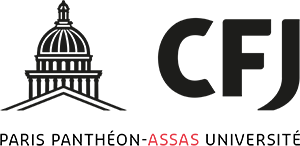Erasmus
The CFJ's Erasmus strategy
Open to the world and its range of cultures, the Centre de Formation des Journalistes is an innovative higher education institution which aims to spread knowledge in the field of media and journalism to a wide audience. Focused on professional integration, we believe in learning by doing and since we work closely with French media, we are obliged to respect certain constraints in terms of our courses and our calendar (internship dates and the dates of different media’s professional exams)
1. Academic fields
Generally speaking, the CFJ’s aim is to develop European and international cooperation in the following areas:
1.1. Journalism, primarily :
(a) A to Z training in the written press, magazines, audio-visual techniques, mobile journalism, data, etc.);
(b) Media innovation and creation of new platforms;
(c) Ethics and professional deontology;
(d) The fight against fake news.
1.2. Related or complementary subjects
Humanities, economic and social science, business and marketing; design, NICTs; cinema, fiction and audio-visual creation.
2. Measures taken and choice of partners
Our choice of partners, which is the widest and most varied possible, is based on their willingness and ability to help the CFJ to:
- Allow incoming and outgoing students to follow an identical or similar cursus to that on offer at the CFJ or in the partner school for a specific period in a different language and/or cultural context. The CFJ is particularly interested in schools which provide technical training;
- Allow incoming and outgoing students to acquire theoretical knowledge and/or techniques which add to the knowledge acquired at the CFJ or in the partner school. In this context, the CFJ aims to build ambitious courses, if possible leading to a double diploma;
- Promote internships (mainly in the media) for incoming and outgoing students in a different language and/or cultural context;
- Allow the teaching staff at the CFJ or abroad to make short or long-term trips to the CFJ or to the partner school in order to teach and/or complete research (in the fields listed above or in the field of educational techniques);
- Allow other members of staff at the CFJ or abroad to make short or long-term trips to the CFJ or to the partner school in order to share best practices and/or promote the development of digital tools.
In terms of research, the CFJ’s professional focus means we have based our strategy on building the partnerships we need to improve international visibility. We are thus working with the Ecole des Hautes Etudes en Sciences Sociales (EHESS) on an encyclopaedia and our two schools run a History Week seminar every two years, bringing together historians, sociologist and journalists from around the world. The CFJ is also a member of the EUACOM HESAM group for schools which have signed the Erasmus + charter.
3. Geographical regions
The geographical regions we are currently focusing on are Europe and North America. Avenues for cooperation are also being explored with Asia (China) and African (Morocco, Benin). The CFJ is a member of the international Cumulus network, which provides access to cooperation possibilities around the globe. The CFJ also hopes to sign a number of framework agreements, allowing us to deliver our diplomas abroad – in Africa and China, among others – or create a double diploma.
4. Target audience
4.1. Graduate students
The CFJ’s efforts in terms of mobility focus mainly on graduate students. In educational terms, the experience a student can gain while abroad (for their studies or an internship) can be a definite plus for finding their first job. The CFJ therefore encourages students to pursue their education abroad and we aim to send 2% of our student body abroad for the 2020-2021 school year.
In order to reach this aim, the CFJ has decided to develop several international tracks which are modelled on the agreement with Laval University in Canada we signed in 2006 and renewed in 2018.
4.2. School staff
Teaching staff in order to teach and/or share best teaching practices and digital tools;
Administrative staff in order to share best practices (healthy management, tools)
The CFJ holds the Erasmus+ Charter and acts in line with the ambitious aims set out by the European Union in terms of higher education.
Click here to read The Erasmus Charter.
For more information, please click here: http://www.erasmusplus.fr/
ECTS credit transfer and recognition
Credit transfer policy
The agreements signed between partner schools define a common study plan for their students’ stay abroad. All academic activities which are part of the CFJ’s degree programme are fully recognized (class content, number of ECTS, fairness in relation to the students who have stayed in France), on the basis of 30 ECTS per semester. The ECTS system serves as the basis for all study abroad programmes. This means the programmes on offer at the CFJ and at our partner schools are easy to interpret, and facilitates academic recognition
As part of any given partnership and within the context of course catalogues, students who study abroad must set out a learning or internship agreement with their Head of Studies, listing the courses and the credits which must be validated at the host institution (or the tasks they will complete in the case of an internship).
Academic recognition of study abroad programmes
For incoming students, the teaching staff check grade sheets have been validated and sent within the given time frame to both the students themselves and their home institution at the end of the programme, as set out in the terms of the partnership.
At the end of an outgoing student’s study abroad programme, the host institution sends their grade sheet to the CFJ. The Head of Studies checks everything matches the initial learning agreement and transmits the grade sheets to the department in charge of registering the grades. For an internship completed abroad, a certificate testifying to the tasks completed is delivered by the host company in accordance with the exact terms of the internship agreement (duration, responsibilities, skills acquired).
The credits earned in this way count towards the student’s final degree, which necessarily includes any credits validated while abroad. No extra course or examination is required, except if the student concerned has failing grades. If a student has partially validated their credits, they can complete a probationary exercise.
Le média de la 77e qui vous plonge au cœur des Pays-Bas
L'EUROPE A PERTE DE VUELe dossier spécial de la majeure newsroom de la 77e
MOULALe média éphémère sur Instagram de la 76e promo Local/Global
LUNDI DE L'INALe « Lundi de l’Ina » dédié à la protection des océans, organisé par la 77e et l’Ina
POLSKALe magazine de la 77e promo à Varsovie
WL'école post-bac
 |
Établissement d’enseignement supérieur privé 210 Rue du Faubourg Saint-Antoine 75012 Paris 01 44 09 42 02 |

210 Rue du Faubourg Saint-Antoine
75012 Paris
01 44 09 42 02
.svg) |
Nous trouver |
